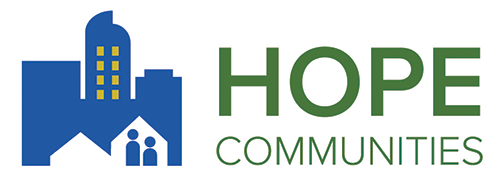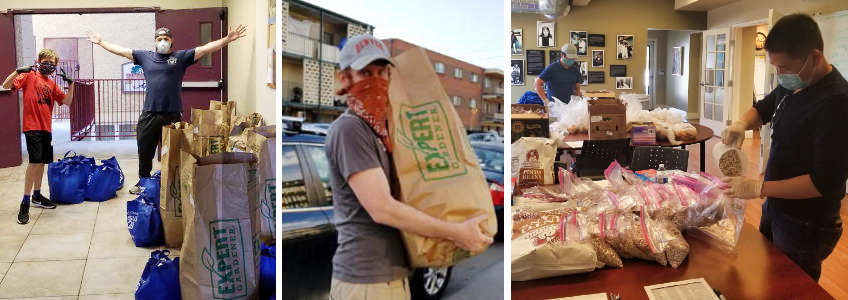With the Coronavirus crisis, many throughout our communities are learning what Hope Communities has known for 40 years: our social safety nets are not supporting the need that exists. So many people throughout our state, our country and our world are living on the edge of a very thin cliff with no resources to survive a minor crisis, much less what we are experiencing with the current pandemic. A clear example of how we are seeing this unfold is the rapid increase in food insecurity.
With the first week of the crisis, we had to quickly change operations to keep everyone safe and ensure physical distancing measures were enacted while making sure residents and clients received the food and supplies they needed for their families. In addition to hundreds of sack lunches distributed to children each week, and with support from our partners, the Village Exchange Center and an emergency grant from the Colorado Hunger Relief Fund, we packaged and delivered about 40 boxes of food directly to resident and client doors.
As stay-at-home measures continued and we had to reduce the number of in-person meetings with residents and clients, our teams began reaching out to each household individually via phone. We wanted to check-in with everyone, make sure they were safe, and learn about potential needs that may have changed. We quickly learned of a much greater need for food throughout our communities. Every week the number of families in need has increased; this week we delivered more than 100 individually packed boxes to the doorsteps of families who are in need.
CONTINUED FROM NEWSLETTER >> While we were passing out boxes, many more residents asked for support. With food delivery, we are also distributing hand sanitizer, toilet paper and masks to help families stay safe. To learn more about how you can support our food distribution efforts, please contact our volunteer coordinator, Monique Shuler (monique@hopecommunities.org).
In addition to hunger relief, our teams have been working tirelessly to provide resource navigation, help residents who have lost income apply for emergency rent and utility assistance, file unemployment claims, and secure needed resources for vital purchases — such as medicine, transportation to the doctor, and essential bills such as internet service so their children can participate in online learning.
Prior to the crisis, many resident and client households were not equipped with internet, an added monthly expense that many cannot afford. This quickly became a necessity with schools moving to online learning for the balance of the year. Our staff has been supporting technology integration in households to help children connect with their schools. Hope staff also created and sent activity packages that included markers, activity books, art supplies, snacks and notes of encouragement to children who normally participate in Hope’s after-school programs.
In light of the large percentage of refugees, asylees and immigrants from around the world that we serve, Hope teams have been translating flyers and materials containing information and resources in multiple languages. We have added new members to our navigation teams who have been reaching out personally to residents in their native tongue. Understanding the ramifications of COVID-19 is challenging for anyone, and we have been working to ensure residents and clients comprehend all the nuances and recommendations related to pandemic response.

